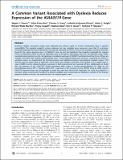A common variant associated with dyslexia reduces expression of the KIAA0319 gene
Abstract
Numerous genetic association studies have implicated the KIAA0319 gene on human chromosome 6p22 in dyslexia susceptibility. The causative variant(s) remains unknown but may modulate gene expression, given that (1) a dyslexia-associated haplotype has been implicated in the reduced expression of KIAA0319, and (2) the strongest association has been found for the region spanning exon 1 of KIAA0319. Here, we test the hypothesis that variant(s) responsible for reduced KIAA0319 expression resides on the risk haplotype close to the gene's transcription start site. We identified seven single-nucleotide polymorphisms on the risk haplotype immediately upstream of KIAA0319 and determined that three of these are strongly associated with multiple reading-related traits. Using luciferase-expressing constructs containing the KIAA0319 upstream region, we characterized the minimal promoter and additional putative transcriptional regulator regions. This revealed that the minor allele of rs9461045, which shows the strongest association with dyslexia in our sample (max p-value = 0.0001), confers reduced luciferase expression in both neuronal and non-neuronal cell lines. Additionally, we found that the presence of this rs9461045 dyslexia-associated allele creates a nuclear protein-binding site, likely for the transcriptional silencer OCT-1. Knocking down OCT-1 expression in the neuronal cell line SHSY5Y using an siRNA restores KIAA0319 expression from the risk haplotype to nearly that seen from the non-risk haplotype. Our study thus pinpoints a common variant as altering the function of a dyslexia candidate gene and provides an illustrative example of the strategic approach needed to dissect the molecular basis of complex genetic traits.
Citation
Dennis , M Y , Paracchini , S , Scerri , T S , Prokunina-Olsson , L , Knight , J C , Wade-Martins , R , Coggill , P , Beck , S , Green , E D & Monaco , A P 2009 , ' A common variant associated with dyslexia reduces expression of the KIAA0319 gene ' , PLoS Genetics , vol. 5 , no. 3 , e1000436 . https://doi.org/10.1371/journal.pgen.1000436
Publication
PLoS Genetics
Status
Peer reviewed
ISSN
1553-7390Type
Journal article
Description
This work was supported by the Wellcome Trust (MYD, SP, TSS, JCK, RWM, PC, SB, and APM), the Intramural Research Programs of the National Human Genome Research Institute (MYD and EDG) and National Cancer Institute (MPO), and the NIH/Ox-Cam Graduate Partnership Program (MYD).Collections
Items in the St Andrews Research Repository are protected by copyright, with all rights reserved, unless otherwise indicated.

